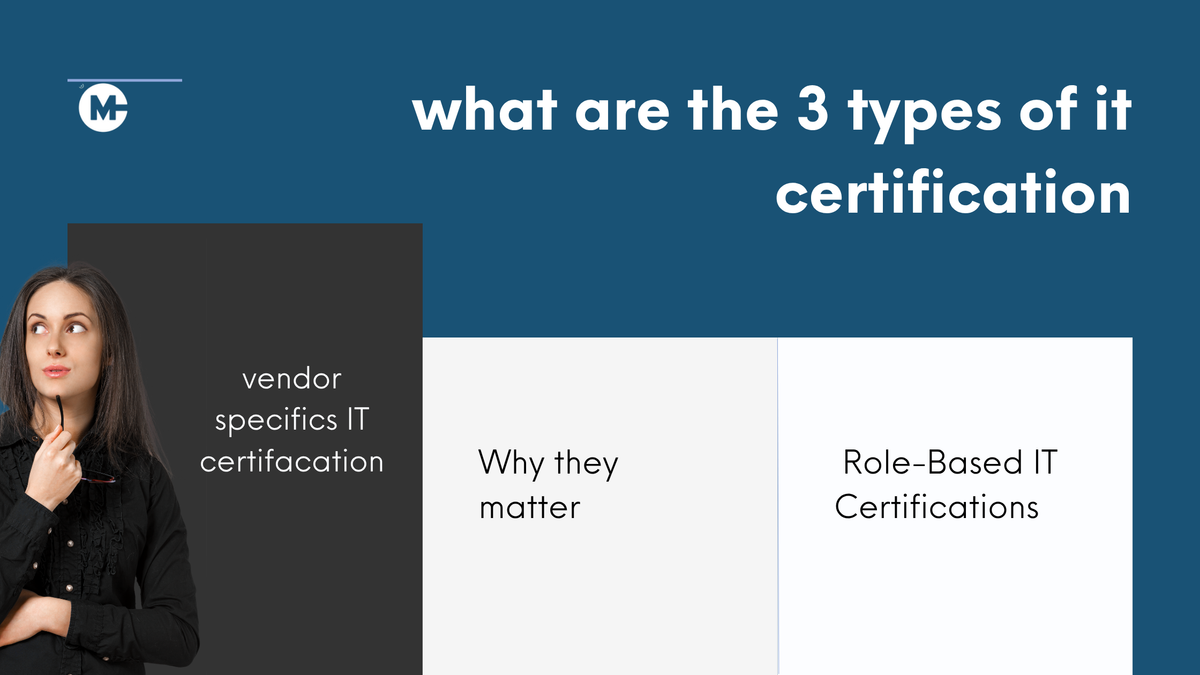What Are the Three Types of IT Certification that Anyone can do?

In the current tech landscape, being certified is practically a necessity for not only proving to employers that you have the skills they’re looking for but also gaining that extra edge over your competition. Whether you’re a school-leaving student waiting to break into the IT industry, an industry member looking to upgrade your achievements or a company trainee hopeful of specializing in new technologies, knowing what classification of certification you can obtain will help open doors for you.
At CourseMonster, you can explore hundreds of IT certifications from leading technology vendors, ensuring your learning journey is both relevant and globally recognized.
1. Vendor-Specific IT Certifications
What are vendor-specific certifications?
Vendor-specific certifications are designed and offered by major technology companies to certify professionals in their proprietary technologies, software, and systems. These certifications focus on how to use, manage, and troubleshoot specific platforms or products.
Examples include:
Microsoft Certifications – For Azure, Microsoft 365 and Power Platform.
Cisco Certifications – Focused on networking, security, infrastructure.
AWS Certifications – Cloud computing, DevOps, and architecture Specialized on:
Why they matter:
Vendor-focused credentials are helpful for veterans who work with a given vendor’s tech stack. For example, getting an AWS Certified Solutions Architect or Microsoft Azure Administrator credential can make you extremely desirable for a cloud-related role.
Ideal for:
IT ops practitioners, engineers and administrators who directly deal with a vendors platform or wish to focus on one ecosystem.
What are vendor-neutral certifications?
Unlike vendor-specific programs, vendor-neutral certifications cover broad IT concepts, principles, and skills that apply across multiple systems and technologies. These certifications validate foundational and transferable knowledge, making them highly valuable for career flexibility.
Popular examples:
- CompTIA Certifications – Such as CompTIA A+, Network+, and Security+, which build strong foundational skills in hardware, networking, and cybersecurity.
- ISACA Certifications – Including CISM and CISA, focused on IT governance and security.
- PMI Certifications – Such as PMP® for IT project management.
Why they matter:
These certifications are ideal for learners who want to understand core technologies and frameworks without being tied to one vendor. For example, a CompTIA Security+ certification is respected worldwide as an entry-level cybersecurity qualification.
Ideal for:
Beginners, multi-platform IT professionals, and anyone pursuing careers in support, administration, or IT management.
3. Role-Based IT Certifications
What are role-based certifications?
Role-based certifications focus on specific job functions rather than products or vendors. These certifications validate the skills required to perform particular roles such as network engineer, cybersecurity analyst, data scientist, or cloud architect.
Examples include:
- Microsoft Role-Based Certifications – Such as Azure Data Engineer or Power Platform Functional Consultant.
- EC-Council Certifications – Like Certified Ethical Hacker (CEH), which prepares professionals for cybersecurity roles.
- Google Cloud Role-Based Certifications – Focused on cloud development, administration, and data engineering.
Why they matter:
As organizations increasingly prioritize practical, job-ready expertise, role-based certifications provide proof that you have the exact skill set required for a particular job. Employers often use these as benchmarks during hiring and promotion decisions.
Ideal for:
Professionals aiming to specialize in a particular IT role or industry segment.
How to Choose the Right IT Certification Path
Selecting the right certification depends on your career goals, current experience, and industry demand.
Ask yourself:
- Do I want to master a specific vendor’s technology (e.g., Microsoft or Cisco)?
- Do I need a foundational certification that applies across all IT systems (e.g., CompTIA or ISACA)?
- Am I targeting a particular career role like data analyst, network engineer, or cloud architect?
At CourseMonster, you can explore tailored learning paths to help you choose wisely and gain certifications recognized by global employers.
Why IT Certifications Matter
Earning an IT certification does more than validate your skills—it boosts confidence, increases job opportunities, and strengthens your professional credibility. Many organizations prioritize certified professionals for their proven commitment to growth and expertise.
With CourseMonster’s IT training, you’ll have access to:
- Accredited training partners
- Expert instructors
- Flexible learning formats (online, in-person, or hybrid)
- Global certification exams
Conclusion
In the IT field, you can’t just learn from your colleagues: lifelong learning is a must. Whether that’s getting certified to specialize in a platform, gaining vendor-neutral certification for wider expertise or enhancing your career prospects with role-based certification, they are all designed to help you succeed.
Explore hundreds of IT certification courses at CourseMonster, from Microsoft and AWS to CompTIA and Cisco. Start learning today and take the next step toward building a future-proof career in technology.

Comments ()